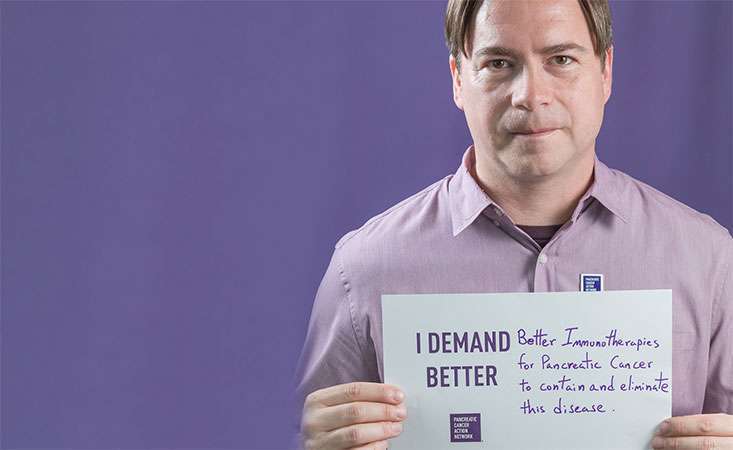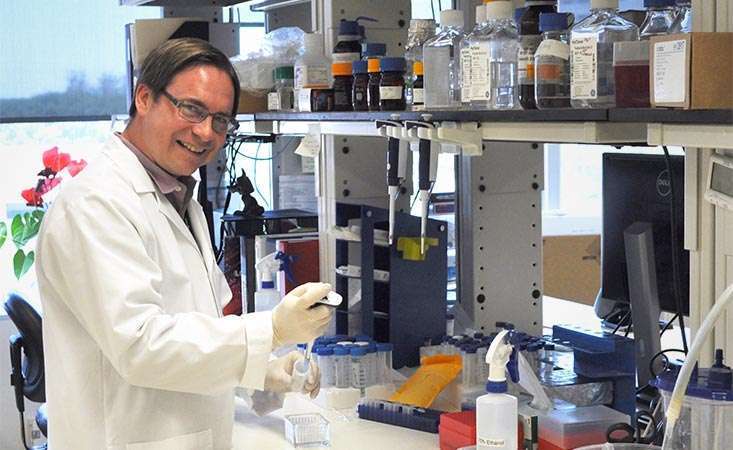
Michael Curran, PhD, is a Pancreatic Cancer Action Network research grantee and associate professor of immunology at MD Anderson Cancer Center.
Editor’s note: Michael Curran, PhD, is a 2018 Pancreatic Cancer Action Network (PanCAN) Translational Research Grant recipient. He is an associate professor of immunology at MD Anderson Cancer Center in Houston, where he studies tumor immunology and immunotherapy. He tells us why he chose to research pancreatic cancer. You may also want to read a recent related story about one of Curran’s favorite professors, who died of pancreatic cancer.
What drew you to pancreatic cancer as a field of study?
[At MD Anderson], we’ve been part of some of the most dramatic advancements in immunotherapy in treating other malignancies, such as melanoma, where it’s been extremely successful in changing patient outcomes.
It’s been frustrating that pancreatic cancer patients haven’t been able to experience the same benefits through immunotherapy. I wanted to get in involved with pancreatic cancer research to try and change that. It is very much needed.
Why are you excited to be a PanCAN grantee?
I’m thrilled to have received a PanCAN research grant. It enables us to carry forward some of the research that is starting to show promise in the lab in even some of the most aggressive models of pancreatic cancer.
It’s exciting to get the support we need to advance this research and then to be able to bring new treatments to patients.
Talk about why more pancreatic cancer research funding is still very much needed.
It’s critically important to donate to pancreatic cancer research because there is such a great need. The disease is poised to become the second leading cause of cancer-related death by 2020.
Yet the amount of funding for pancreatic cancer research is dramatically less than for many other cancers and other diseases that have a similar mortality. Many of us are working hard to advance research and bring better therapies to the clinic, but right now those efforts are restricted by the limited amount of funding that’s available.
We’re seeing signs that we are making progress against pancreatic cancer. But we need more funding, more engaged researchers and more clinical trials to get to a point where a large number of patients can benefit.
Our deepest gratitude goes to PanCAN donors and supporters. Without them, we couldn’t advance this research. Their support is essential to us being able to do the work that we do. All of our work is supported by donor dollars.
And awareness of the disease is equally important.
Awareness and funding go hand-in-hand. Many people are surprised by the impact the disease is having in the community. Awareness of pancreatic cancer relative to awareness of other cancers has historically been lower, therefore researching funding is lower, too. Awareness leads to more support, more research and better therapies, which can improve patient outcomes.
Also, it’s really important for people to know the signs and symptoms for pancreatic cancer, which can often go undiagnosed until it’s at a late stage and difficult to treat.

Curran at work in his lab.
From your lab, how do you stay connected to the patient?
Our lab does mostly basic research, although we also conduct some pancreatic cancer clinical trials. Even though I don’t see patients one-on-one, we follow the personal stories that we hear about. Pancreatic cancer clinical trial patients are among the most grateful.
One patient was so thankful that because of a clinical trial, he saw his daughter’s graduation – he had thought he might not make it. These stories make our work extremely rewarding.
You mention clinical trials, and at PanCAN we encourage clinical trials at diagnosis and every time a treatment decision is made.
Pancreatic cancer patients should absolutely consider clinical trials. Standard of care treatment is limited for pancreatic cancer.
But there are new innovative therapies out there that are only available through clinical trials. Don’t give up hope. We’re getting better at targeting the most aggressive pancreatic cancer, and better therapies are coming.





